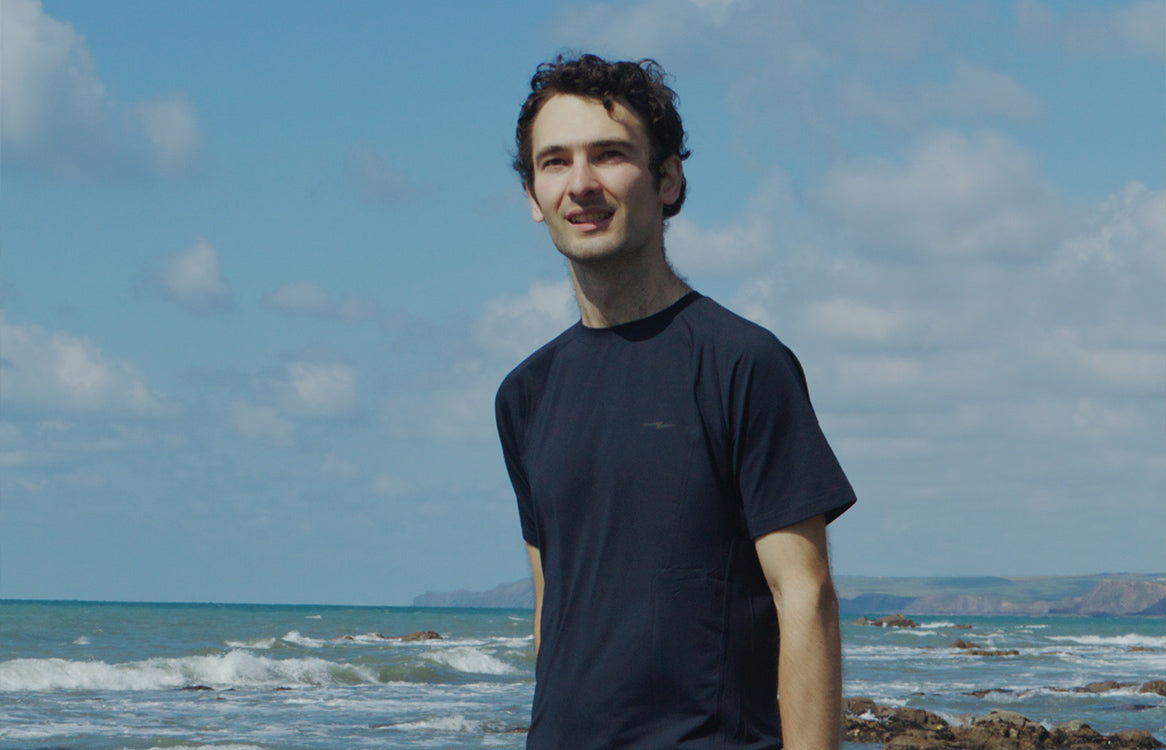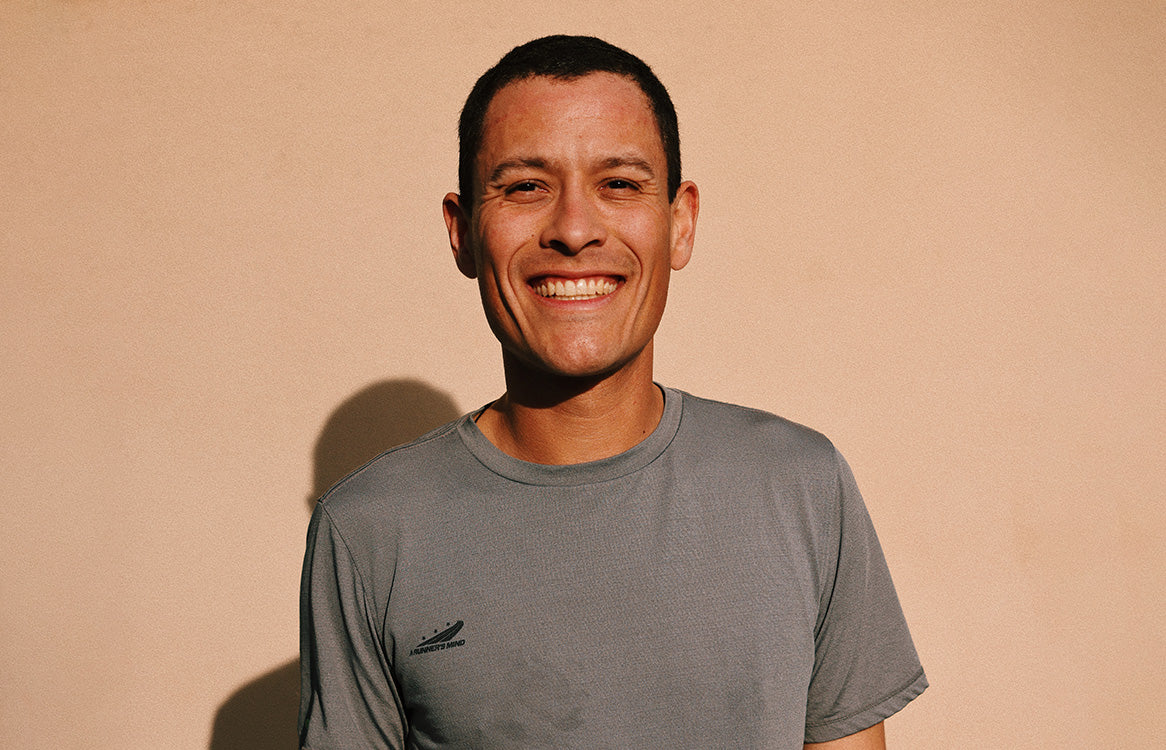Nick Kovaleski, a founding member of the Low Impact Alliance and operations manager for A Runner’s Mind – a run-focussed retail outlet in the Bay Area, California – talks to us about how authenticity, honesty and passion are the driving forces behind better environmental stewardship.
If you were going to make a feature for why you should run, you would not go far wrong in casting Nick Kovaleski as your anchor. Sat in front of a bright blue backdrop that could equally be the Californian sky, the first thing that strikes you about Nick is his smile. By that I don’t mean a flashy, camera-ready smile, but rather one that crinkles at the eyes; stretches the jaw and cheeks; raises the eyebrows, perhaps even gets the hands involved for extra emphasis. It’s a smile that says, “Hey! I’m here, I’m listening, I’m present; let’s have a conversation!” It’s a smile that radiates. A contagious smile. A smile that makes you smile in return. In other words: it’s a smile that’s ‘all in’.
Smiles aside, it’s no surprise that Nick was raised on his father’s mantra of, “If you’re gonna do something, put all of yourself into it”, which is the underpinning of what he considers having an impact on the world to mean. “Genuine impact is about living your message as truly as possible. Really, you know, believing in something and following through with your mission as if it’s the only thing that matters,” he enthuses. It’s certainly no coincidence that hylo’s latest shoe, the Impact, has been launched a matter of days before our conversation; however, this notion of what elevates our actions from tokenism to impact, is one that consumes a lot of Nick’s thinking, and, in particular, how retail interests can, not only be balanced with a love for the planet, but be a force for education, community engagement and action.
Nick was raised with sales very much in his blood; his father working for Brooks Brothers and his mother for Nordstrom. Likewise, nature, growing up a stone’s throw from a 1,000-acre State Park in Connecticut, and athletics, starting with soccer and gravitating towards running in high school, have always been a strong influence in his life. Even before joining A Runner’s Mind eight years ago, movement, for Nick, has never just been about fitness; he recognises the capabilities of his body and wants to use it as much as possible. It’s a perspective that chimes with the Runner’s Mind ethos of being about more than ‘just running’ or having the latest gear, as well as going some way to breaching that seemingly insurmountable binary between consumerism and climate consciousness. “We’re really about everybody’s fitness journey and making sure that everybody feels like they have the correct gear for them, and that they feel confident in what they’re doing,” Nick explains. “That’s really what fitness is all about: having confidence and then building even more confidence, then building a community of people who want to get out and move and enjoy the world around them.” In essence, then, by prioritising what is actually needed on an individual level, a more mindful model of retailer-consumer relationship can start to emerge.

The secret to really getting to know someone, Nick suggests, is listening. “We truly pride ourselves in listening to what a customer has to tell us, and then pulling shoes that are truly best for them. I don’t want to pull a specific brand off the shelf because I’m required to, based on a pre-existing relationship with that brand (as many larger stores have a tendency to do); I want to pull shoes that are right for that person. It’s about giving them a full 360-degree experience to make sure that they leave feeling like they heard everything they needed to hear. They’ve heard about insoles; they’ve heard about socks; they’ve heard about nutrition; they’ve heard about reflectivity if its winter. Maybe they’re not buying all of those things, but they’re leaving the store feeling, ‘Wow, I just had a really great experience with someone who actually understands what it is that I’m doing!’”
“Like an exercise in empathetic sales?” I suggest. “Absolutely!” Nick agrees. “Being able to connect with those people and really making them feel heard and seen. Like they have a place where they can go to get answers and talk to somebody about something – someone who cares about what they care about.”
In terms of Nick’s parallel journey of caring for the environment, he can identify a turning point as when he became vegetarian in October 2010. His roommate in senior year of college had been raised as a vegan all her life and challenged him to go plant-based for a week. That week turned into fourteen years and Nick hasn’t looked back since. This commitment to doing things differently for the sake of the planet has evolved recently through Nick’s involvement with The Low Impact Alliance, a global collective of retailers, athletes, and brands advocating for a more sustainable running industry. He first met Christian and Keri, of Palmetto Running Company, when attending the 2021 On Impact Awards. It was them receiving the award that year and, during their acceptance speech, they mentioned starting the LIA. Nick was intrigued enough to approach the brother and sister after the ceremony and, what began as a casual exchange about being more vocal about environmental stewardship, has now grown into brand partnerships and the creation of ‘plogging’ kits for retail stores to hand out to runners and walkers to do litter picks on jogs (hence ‘plogging) and hikes.
Nick is keen to stress the Alliance’s focus on the bigger picture of championing the good that brands and stores are doing, rather than calling anybody out. “One thing Christian has always said is that we want to ‘call people in’ not ‘call people out’.” Nick expands. “Our goal is not to say, ‘Hey, Brand X; you shouldn’t be using this material in your upper, or you shouldn’t be using this dye in your fabrics.’ Yes, they shouldn’t be doing that, but that’s not our goal; let’s not flog a dead horse. Let’s really uplift something that’s actually the solution and start to shout about companies and products that are getting it right.”

As with customers, it’s about keeping the conversation between stores and brands going, so that they are both working to ensure that commitment to sustainably manufacturing high quality product, on the part of the company, is met with high quality storytelling by the store. It ultimately comes down to a question of value: the industry recognising that stores are a part of their marketing strategies, which in turn helps to change the perspective of runners and their consumer choices.
It’s this mindset that A Runner’s Mind brings to their sustainability mission, nudging people towards positive choices instead of lecturing them on what they are doing wrong. From Nick’s perspective it’s about getting customers (or ‘guests’ as he refers to them) to really appreciate what they are buying as an investment in quality and longevity over cheaper, throwaway alternatives. There are also practical initiatives that are being implemented; companies like hylo are developing systems for sending a shoe back to the company at the end of its life for recycling into new product. It’s a concept that really lights Nick up: “We’ve always been able to have those conversations with guests to say, ‘Hey, take care of your shoes!’ But now we can have the conversation of, ‘Hey, take care of your shoes, and there’s also a solution at the end of its life cycle.”
It’s this mindset that A Runner’s Mind brings to their sustainability mission, nudging people towards positive choices instead of lecturing them on what they are doing wrong. From Nick’s perspective it’s about getting customers (or ‘guests’ as he refers to them) to really appreciate what they are buying as an investment in quality and longevity over cheaper, throwaway alternatives. There are also practical initiatives that are being implemented; companies like hylo are developing systems for sending a shoe back to the company at the end of its life for recycling into new product. It’s a concept that really lights Nick up: “We’ve always been able to have those conversations with guests to say, ‘Hey, take care of your shoes!’ But now we can have the conversation of, ‘Hey, take care of your shoes, and there’s also a solution at the end of its life cycle.”
It gives him faith that something approaching full circularity in the running industry is achievable, with the store being a microcosm of how things are progressing. Alongside the bins for recycling nutrition packages, they are now able to recycle socks and apparel, as well as shoes. In fact, it is not the efficiency of systems that cast shade on Nick’s optimism but how to achieve customer buy in. “It’s not going to be easy,” he admits. “I think the biggest challenge is the mindset shift. It’s not like the brands can’t make the products that can be recycled. That’s not a question. It’s how you get people to take the extra step to bring the shoes back to the running store rather than the easy option of throwing them in the bin. Getting people to be conscious when they are at home: that’s going to be the hardest part!”

I wonder if this also extends to the kind of shoes that we have seen winning marathons in recent months. Nick is someone who, as well as running for wellbeing, also likes the challenge of running fast. If his body has the capacity to run a seventy-two-minute half-marathon, he will certainly not be sitting on the sidelines; he will be out there running a seventy-two-minute half-marathon. It’s a question he doesn’t necessarily have the answers to but feels that much of the answer lies with brands themselves and their technological advances. It’s a belief that, once again, means working with companies, not against them.
“I guess my hope is that there’s ways that we can find to make a fast shoe with something that, unlike carbon plates, is recyclable. The reason why electric cars came into existence is because we realised that, now people have the ease of using a car, they are going to continue using a car. Likewise, rather than trying to say, ‘Okay, humans, you’re not allowed to run in fast shoes anymore!’ How about we make fast shoes that have a way to break down, have a way to be recycled, and have more miles in them. There are already good examples elsewhere in the industry; I love hats and all of them are made of recycled plastic bottles. It’s really not hard to do; we can design cool, fun, colorful products that are made the right way.”
Photo by: Lindsey Pfeiffer
Read more

One of the founding members of The Green Runners, a running community ‘making changes for a fitter planet’, David is a person whose need to run is intrinsically wrapped up with his urgent call to a...

Palmetto Running Company is an organisation that is not so much a chain of stores as a set of values: values that inspire its tight-knit community to question how they live, work and, of course, ru...

Leave a comment
All comments are moderated before being published.
This site is protected by hCaptcha and the hCaptcha Privacy Policy and Terms of Service apply.